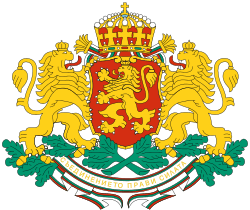Constitution of Bulgaria
 |
| This article is part of a series on the politics and government of Bulgaria |
|
Presidency |
|
The Constitution of the Republic of Bulgaria (Bulgarian: Конституция на Република България, Konstitutsia na Republika Balgaria) is the supreme and basic law of the Republic of Bulgaria. The current constitution was adopted on 12 July 1991 by the 7th Grand National Assembly of Bulgaria, and defines the country as a unitary parliamentary republic. It has been amended five times (in 2003, 2005, 2006, 2007, and 2015) and is chronologically the fourth constitution of Bulgaria, the first being the Tarnovo Constitution of 1879.
Besides the current democratic constitution of 1991 and the initial monarchist Tarnovo Constitution, other Bulgarian constitutions were the Dimitrov Constitution (named after Georgi Dimitrov), in force between 1947 and 1971, and the Zhivkov Constitution (named after Todor Zhivkov), in force between 1971 and 1991. Both were socialist in character.
See also
References
External links
| Wikisource has original text related to this article: |
.svg.png)